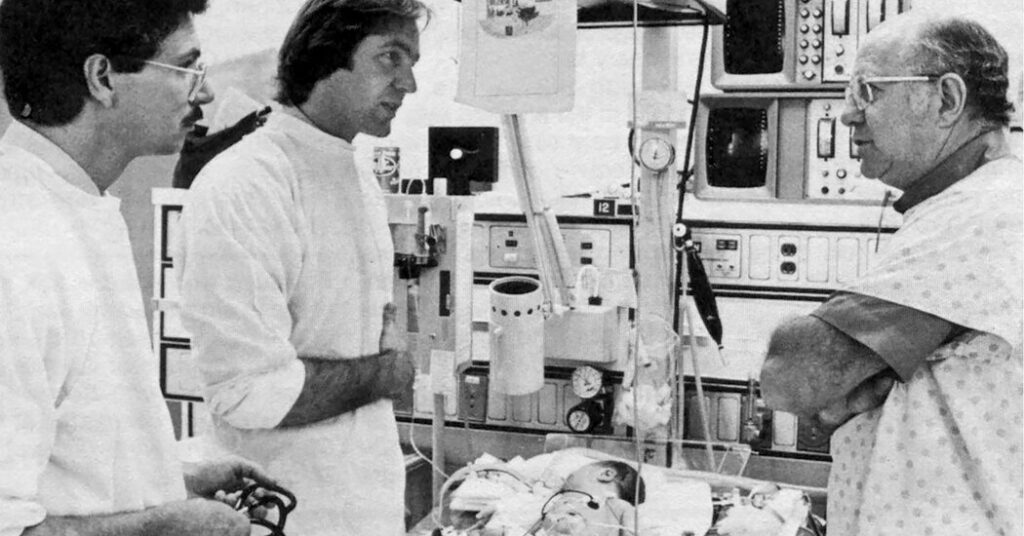Remembering Dr. Philip Sunshine: Pioneer of Neonatology
Dr. Philip Sunshine, an influential figure in the field of neonatology, passed away on April 5 at his residence in Cupertino, California, at the age of 94. His daughter, Diana Sunshine, confirmed his passing.
The Early Years and the Birth of Neonatology
Dr. Sunshine’s career in medicine began in an era when the care for premature infants was rudimentary at best. In the late 1950s, it was common for over half of premature infants to succumb shortly after birth, primarily due to a lack of specialized care and funding from insurance companies.
As a pediatric gastroenterologist, Dr. Sunshine believed that many of these fragile children could be saved. He championed the formation of interdisciplinary teams at Stanford University that focused on these vulnerable patients within specialized neonatal intensive care units (NICUs), and he was instrumental in pioneering methods for feeding and respiratory support for premature infants.
A Transformative Shift in Care
The 1960s marked a significant turning point in neonatal care. The term ‘neonatology’ first appeared in literature through the publication “Diseases of Newborn” by pediatrician Alexander J. Schaffer. By this time, Dr. Sunshine had contributed to the establishment of Stanford’s neonatology department, one of the first in the United States.
The premature birth and subsequent death of Patrick Bouvier Kennedy, President John F. Kennedy’s son, highlighted the need for improved neonatal care and propelled federal funding for neonatal research. Dr. Sunshine noted, “The Kennedy story was a big turning point… federal research money for neonatal care became much easier to get.”
Legacy of Education and Training
From 1967 to 1989, Dr. Sunshine served as the chief of Stanford’s neonatology department, playing a crucial role in training a generation of doctors in the field. Upon his retirement in 2022, he witnessed the survival rate for infants born at 28 weeks surpass 90 percent.
Dr. Sunshine’s legacy is reflected in statements from contemporaries who recognized his foundational contributions. David K. Stevenson, his successor, referred to him as “a neonatologist’s neonatologist,” underscoring his pivotal role in the development of the specialty.
The Importance of Compassionate Care
Dr. Sunshine understood that technical skills alone were insufficient; compassionate care was equally important. He advocated for parental access to NICUs, believing that skin-to-skin contact was beneficial for both infants and parents. His approach also included empowering nurses to play an active role in patient advocacy and care.
Cecele Quaintance, a nurse who worked alongside Dr. Sunshine for over 50 years, described him as embodying profound kindness, stating, “There is this deep kindness in Phil — to babies, to us, to everybody.”
His Life and Personal Legacy
Dr. Sunshine was born on June 16, 1930, in Denver, Colorado, to Samuel and Mollie Sunshine, who owned a pharmacy. He earned his medical degree from the University of Colorado and completed his residency at Stanford after serving as a naval officer.
His career in neonatology was inspired by his mentor, Louis Gluck, who laid the groundwork for modern NICUs. Dr. Sunshine later expanded his expertise by pursuing advanced training in pediatric gastroenterology.
In 1962, he married Beth Vreeland, and they raised five children together, including his daughter Diana. Dr. Sunshine leaves behind a legacy not only in his family but also in the countless lives he touched throughout his career.
His approach to medicine and patient care brought warmth and positivity, encapsulated by the notion that he brought “sunshine into every room.” Susan R. Hintz, a neonatologist, expressed how Dr. Sunshine’s calming presence made a lasting impression on both staff and families alike.
Conclusion
Dr. Philip Sunshine’s contributions to neonatology revolutionized the care of premature infants, making significant strides that continue to save lives today. His commitment to compassionate care and interdisciplinary teamwork has left an indelible mark on the field, shaping the future of neonatal medicine.


